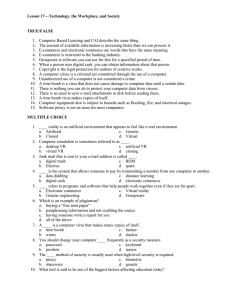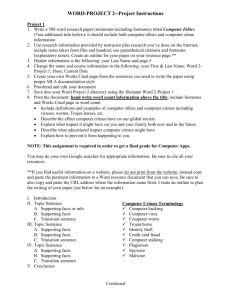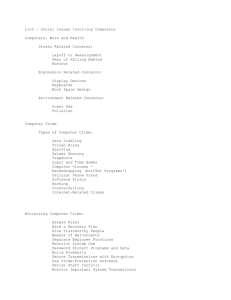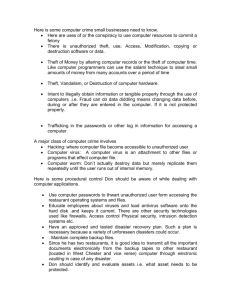Computer Crimes
advertisement
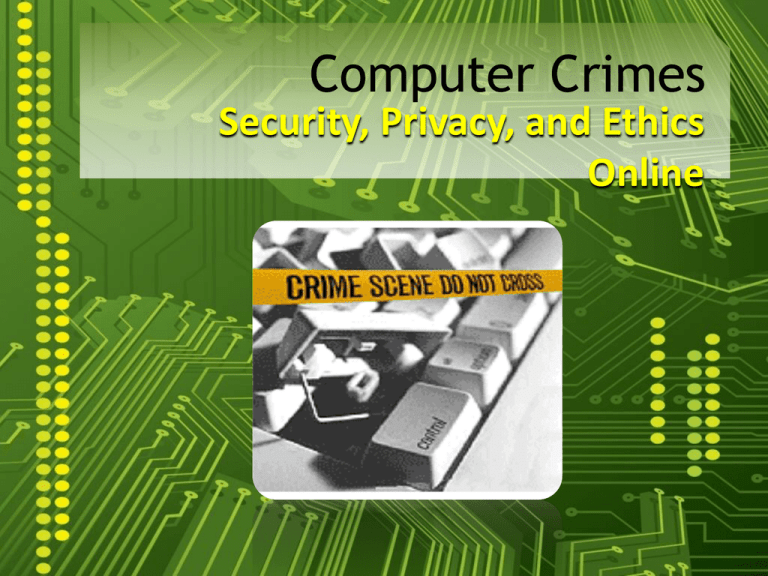
Computer Crimes Security, Privacy, and Ethics Online Objective Given instructions, the learner will discuss the network and web security with 85% accuracy. Computer Crimes • It is a criminal act committed through the use of a computer. Types of Computer Crimes • Unauthorized use of a computer • Infection of a computer by a malicious program (a virus) • Harassment and stalking on the computer • Theft of computer equipment • Copyright violations of a software • Copyright violations of information found on the internet (Sharing Copyright Music or MP3s) Computer Fraud • Is conduct that involves the manipulation of a computer or computer data in order to obtain money, property, or value dishonestly or to cause loss. • Examples of computer fraud include stealing money from bank accounts and stealing information from other people’s computer for gain. Signs of Computer Fraud • Low staff moral: Unhappy staff members may decide the company owes them. • Unusual work patterns. • Staff members who appear to be living beyond their income. Computer Hacking • It involves invading someone else’s computer. • Usually for personal gain or just the satisfaction of invading someone else’s computer. • Hackers are usually computer experts who enjoy having the power to invade someone else’s privacy. • They can steal money, or change or damage data stored on a computer Computer Virus • A program that has been written usually by a hacker, to cause corruption of data on a computer. • The virus is attached to an executable file (like a program file) and spreads from one file to another once the program to executed Types of Virus • • • • Worm Time Bomb Logic Bomb Trojan Horse Worm • A worm makes copies of itself, resulting in the consumption of system resources that slows down or actually halts task. • Worms don’t know to attach themselves to other files. Time Bomb • A time bomb is virus that does not cause its damage until a certain date or until the system has been booted a certain number of times. Logic Bomb • A logic bomb is a virus triggered by the appearance or disappearance of specified data. Trojan Horse • A Trojan horse is a virus that does something different from what that is expected to do. • It may look like it is doing one thing while in actuality it is doing something quite opposite (usually something disastrous) Protect Your Computer From Viruses • Use antivirus software. This software should always run on your computer and should be updated regularly. • Be careful in opening e-mail attachments. It is a good idea to save them to disk before reading them so you can scan them. • Don’t access files copied from floppy disks or downloaded from the Internet without scanning them first. Software Piracy • The illegal copying or use of computer programs. • Software Programs come with a license number or key that are used to install the program correctly to register it with the company online before you can use the program. • Software that is offered online at no cost is call FREEWARE. • SHAREWARE is also available on the internet at no cost to use for a trial period, but then the developer expects to be paid a fee for the software, which may have taken many hours of programming to develop. Other Computer Crimes • Theft of Computer Time – This crime is committed when an employee uses a company’s computer for personal use such as running a small side business, keeping personal records. • Theft of output – Using information you see on someone’s else’s screen or printout to profit unfairly. – Data Diddling is changing data before it is entered into the computer or after it has been entered into the computer Post – Qs? • What is Computer Crimes? – It is a criminal act committed through the use of a computer. • What is Computer Fraud? – Is conduct that involves the manipulation of a computer or computer data in order to obtain money, property, or value dishonestly or to cause loss. • Name one sign of computer fraud in a company. – Low staff moral, Unusual work patterns, and living beyond their income • What is a Hacker? – It involves invading someone else’s computer. • What is a Computer Virus? – A program that has been written usually by a hacker, to cause corruption of data on a computer. • Name four types of Virus. – Worm, Time bomb, Logic bomb, Trojan horse • Name one other computer crime. – Theft of Computer time and Theft of output Computer Security SECURITY ISSUES Objective • Given instructions, the learner will discuss the network and web security with 85% accuracy. Computer Security • Computer security is necessary in order to keep hardware, software, and data safe from harm or destruction. • The best way to protect data it to effectively control the access to it. • The most common form of restricting access to data is the use of Passwords (Password are used to protect data against unauthorized users). Other Security Measures • Electronic identification cards are used to gain access to certain areas within a building or department. • Firewalls, which consist of special hardware a software, protect individual companies’ network form external networks. • Antivirus software are used to protect data on your computer. Other Security Measures for Companies • Institute a very selective hiring process that includes careful screening of potential employee. • Regularly back up data and store it offsite. • Employ Biometrical Security Measures, which examine a fingerprint, a voice pattern, or the iris or retina of the eye. Cookies • Small files that are created when you visit a Website and are stored on your computer, then accessed again the next time you visit the site. • It makes it easier for you to use the website when you return and it also provides the Web owner with information. Spyware • A program installed on your computer without your knowledge, usually when you download a file. • Spyware tracks your Web habits and take control over your computer and direct you to websites. • Spyware can be harmful as well as annoying; firewalls consisting of hardware and software features can protect your computer from unauthorized spyware programs. Piracy • Piracy is a theft of intellectual property. Laws that Protects Users • The Copyright Act of 1976: • Computer Matching & Protects the developer of Privacy Protection Act, software. 1988: Regulates how federal data can be used to • Software Piracy and determine whether an Counterfeiting Amendment individual is entitled to • Electronic Communication federal benefits. Piracy Act, 1986: Prohibits the • Many states also have laws interception of data governing computer communication crimes. • Computer Fraud and Abuse Act, 1986: Prohibits individuals without authorization from knowingly accessing a company computer to obtain records from financial communication. The Golden Rule “Do unto other’s as you would have them do unto you!” Post – Qs? • Why is computer security necessary? – Computer security is necessary in order to keep hardware, software, and data safe form harm or destruction? • Name a law that has been passed to protect your computer? – 1) Copyright Act of 1976, 2) Software Piracy and Counterfeiting Amendment of 1983, 3) Electronic Commission Privacy Act, 1986, 4) Computer Fraud and Abuse Act, 1986, and 5) Computer Matching & Privacy Protection Act, 1988 • What is cookies? – Small files that are created when you visit a Website and are stored on your computer, then accessed again the next time you visit the site. • What is Piracy? – Piracy is a theft of intellectual property. • What is spyware? – A program installed on your computer without your knowledge, usually when you download a file.
